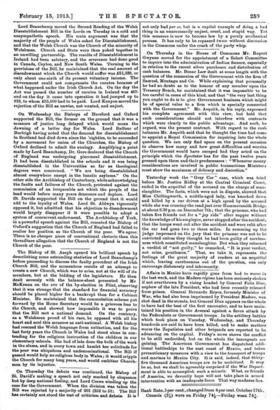The Bishop of St. Asaph opened his brilliant speech by
demolishing some astounding statistics of Lord Beauchamp's before proceeding to discuss the faulty precedent of the Irish Church Bill, and the momentous results of an attempt to create a new Church, which was to arise, not at the will of its members, but at the bidding of the legislature. He then dealt severely with the balance-sheet presented by Mr McKenna on the eve of the by-election in Flint, observing that it was strange that the standard for financial accuracy should be placed higher for a bankrupt than for a Cabinet Minister. He maintained that the commutation scheme put forward by the Home Secretary would be a grievous loss to the Church, and showed how impossible it was to prove that the Bill met a national demand. On the contrary, as a Welshman proud of his race, he opposed with all his heart and soul this measure as anti-national. A Welsh bishop bad rescued the Welsh language from extinction, and for the last forty years the Church in Wales had stood alone in con- tending for the religious instruction of the children in our elementary schools. She had of late done the bulk of the work in the slums, and in every town and hamlet her solicitude for the poor was ubiquitous and undenominationaL The Bill if passed would help no religious body in Wales ; it would cripple the Church for many long years, and would embitter Church- men by its injustice.










































 Previous page
Previous page